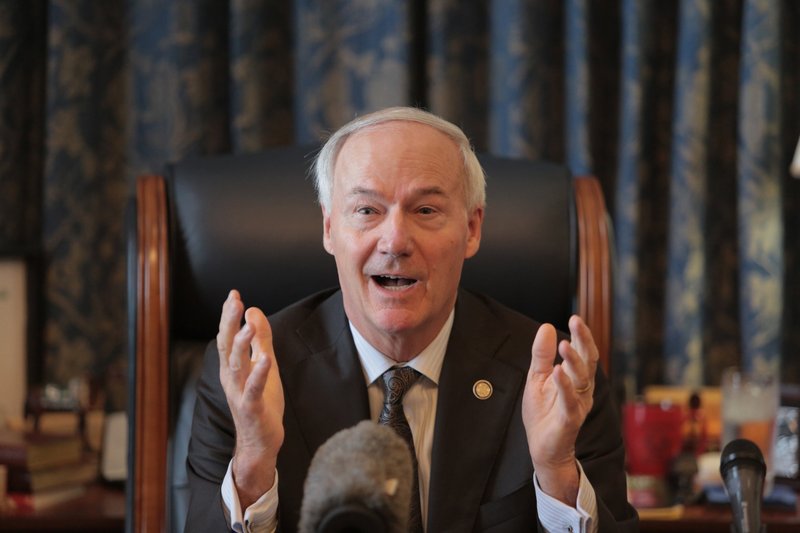A lawsuit by a fired state employee against Gov. Asa Hutchinson and a member of his administration may continue along narrow grounds, the Arkansas Supreme Court ruled Thursday, even as both officials were ruled immune from suit in their official capacities.
The 4-3 ruling by the high court allows Christopher Harris, a former employee of the state's Livestock and Poultry Commission, to continue to pursue redress in state circuit court for what he says was his wrongful termination for refusing to hire an unqualified job candidate who, he says, had Hutchinson's backing.
The governor's office Thursday denied Harris' claims, calling them "factually wrong." The lawsuit does not identify the candidate or say whether that person was hired for the job, a field-livestock inspector position.
Harris' attorney, Luther Sutter II, expressed "hope" that Hutchinson and the deputy director of the commission, Patrick Fisk, would be found liable for monetary damages after the case was remanded to the circuit court for further proceedings.
"The Arkansas Constitution says there's supposed to be a remedy for every wrong," Sutter said.
Pulaski County Circuit Judge Tim Fox dismissed the suit against Hutchinson and Fisk in July 2018, ruling that both parties were protected by the state's sovereign immunity.
Harris appealed that decision but the Supreme Court, in a decision written by Justice Courtney Hudson, declined to back away from its precedent established in a 2018 decision in Board of Trustees v. Andrews. That ruling held that the Arkansas Constitution bars lawsuits against the state, even when the Legislature has opted to allow such suits. The court used the same rationale to strike down portions of the Arkansas Whistle-Blower Act later that year.
Harris' lawsuit was filed under the provisions of the Whistle-Blower Act, which protects employees who, among other things, refuse to carry out a directive they believe violates state law or policy.
The majority of justices found that Harris' claims did not meet any of the court's previously established conditions for overcoming sovereign immunity, while they also questioned the veracity of his claims.
"Harris failed to provide any detail of the interactions that he had with either [Hutchinson or Fisk] before his termination," Hudson noted.
The justice added that "conclusory statements and bare allegations are insufficient to establish an illegal, unconstitutional, or ultra vires act such that sovereign immunity would not apply to either his [whistleblower] or his constitutional claims."
Still, Hudson found that sovereign immunity did not bar Harris from suing Hutchinson and Fisk in their individual capacities. The court remanded the case to the circuit court for further hearings.
Chief Justice Dan Kemp joined Hudson's majority opinion. Justices Karen Baker and Robin Wynne each concurred with the outcome.
In a statement released Thursday, Hutchinson expressed support for the majority ruling.
"The court properly balanced the sovereign immunity protection of the state with the right of individual citizens to seek non-monetary relief in the courts," Hutchinson's statement said. "I will review the decision more closely to determine what are the next steps."
Fisk could not be reached for comment, though a spokeswoman for the Department of Agriculture said the claims made by Harris are "completely without merit."
Attorney General Leslie Rutledge, who defended Hutchinson and Fisk in the lawsuit, also released a statement about the decision expressing disappointment that the case had been remanded to the circuit court for further proceedings. Rutledge said she agreed, however, with the "majority" of the court's ruling.
A frequent critic of the court's decisions related to sovereign immunity, Justice Josephine "Jo" Hart issued a partial dissent arguing that Harris' claims had sufficiently alleged an illegal action by the state, one of the court's recognized exceptions to a sovereign immunity defense. Thus, Hart wrote that the circuit court should continue to hear Harris' official claims against the state, in which he sought his job back.
Justices Shawn Womack and Rhonda Wood also joined a partial dissent, in which Womack wrote that none of Harris' claims should proceed, and that the case should be dismissed.
Metro on 01/10/2020

